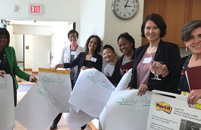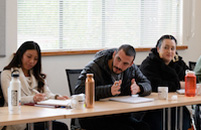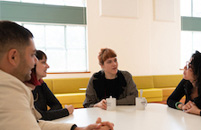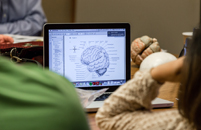
Students have access to a wide array of services to support their success in the program.
 Dean of Students
Dean of Students
We are invested in your growth, development, and success! The Dean of Students works in partnership with faculty and staff to create a community of support for students in their academic and professional development. The role of the Dean of Students is to develop relationships to provide individual guidance and support, provide clarity of policies and procedures, share connections to resources, and coordinate services to support concerns and issues.
 Faculty Advisors
Faculty Advisors
Faculty advisors serve as mentors and guides. They provide professional development feedback, connect you to resources, and help you troubleshoot obstacles and concerns. Additionally, advisors serve as a bridge to professional practice, helping you build your professional network and transition to the role of provider.
 Student Ambassadors
Student Ambassadors
Student ambassadors share their personal experience to help you thrive in graduate school. Ambassadors are available for brief or longer-term informal support.
 Affinity Groups
Affinity Groups
Affinity groups are student-led spaces that foster identity-based community, belonging, and peer support. These groups are created by students, for students—and offer a space to build connection, explore shared experiences, and grow together.
 Social Justice Fellowship
Social Justice Fellowship
The Social Justice Fellowship is a funded leadership opportunity for master’s students in the Counseling Program who are committed to advancing equity, inclusion, and systemic change in mental health care.
 International Student Support
International Student Support
Contact Virginia Morgan for answers to F-1 Visa questions and individual support.
 Office of Accessible Education
Office of Accessible Education
The mission of the Office of Accessible Education is to ensure that all students with disabilities have equal access to educational opportunities at the Wright Institute. Click here to view the Accessibility Resources section of the Counseling Program Student Handbook. Email the Office of Accessible Education for assistance.
 Field Placement Office
Field Placement Office
The Field Placement Office is available to assist you in all aspects of your clinical fieldwork experience. In addition, they help you plan your next steps toward post-degree associateship and licensure. Please contact Victoria Leftridge for questions about agencies and supervisors, and Sam Hyder for help with BBS and Wright Institute forms and associate opportunities. Here is the Field Placement Handbook for more information.
 Tuition & Financial Aid
Tuition & Financial Aid
For questions about tuition, contact tuition@wi.edu. For questions about financial aid and federal work study, contact financialaid@wi.edu.
 Library
Library
Our collection includes books, ebooks, dissertations, videos, and access to over 1,100 full-text electronic journals. For help with research projects, literature reviews, or access to the collection, contact our librarians.
 The Wright Institute Tech Support Team
The Wright Institute Tech Support Team
Contact the WI Tech Support Team for help with the WI Portal, G Suite, Google Classroom, Zoom, computer problems, or any other technical issue you're experiencing. You can also contact us about enrollment, name changes, transcripts, diplomas, licensing certification letters, and FERPA. We are experts with tons of experience and will provide timely, professional service. Email the Tech Support Team or call/text 510-592-8566.
 The Wright Institute Continuing Education Program
The Wright Institute Continuing Education Program
CE Administrator: Julie Thiesen
CE Director: Dr. Gilbert Newman
View upcoming workshops and join our mailing list.
There are many ways to get involved outside the classroom and contribute to the Wright Institute community. Students may take on leadership roles as Student Ambassadors, Social Justice Fellows, Counseling Program Advisory Board (CPAB) members, or Affinity Group Facilitators. Additional opportunities include participating in student-led events, affinity groups, faculty forums, and limited teaching assistant (TA) or work-study positions. These experiences allow students to build leadership skills, foster connection, and support equity and inclusion within the program and the broader field of mental health.
